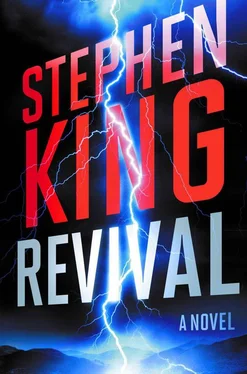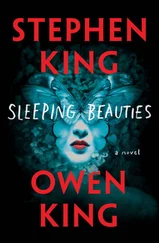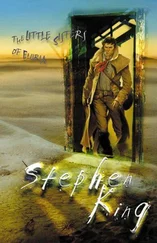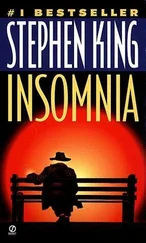I don’t remember yanking open the top drawer of the bureau; I only know that all at once the gun was in my hand. I believe if it had been an automatic with the safety on, I would have just stood there, pulling at the frozen trigger, until the thing arose, shambled across the room, and seized me. That claw would have pulled me into its gaping mouth and into that other world, where I would face some unspeakable punishment for daring to say one word: No.
But it wasn’t an automatic. It was a revolver. I fired five times, and four of the bullets went into the thing trying to rise from Mary Fay’s deathbed. I have reason to know exactly how many shots I fired. I heard the roar of the gun, saw repeated muzzle-flashes in the gloom, felt it jump in my hand, but all of that seemed to be happening to someone else. The thing flailed and fell back. The melted faces screamed with mouths that had merged. I remember thinking, You can’t kill Mother with bullets, Jamie . No, not her .
But it was no longer moving. The obscenity that had come out of its mouth lay limp, trailing on the pillow. The faces of Jacobs’s wife and son were fading. I covered my eyes and screamed, over and over again. I screamed until I was hoarse. When I lowered my hands, the claw was gone. Mother was gone, too.
If she was ever there in the first place , I hear you say, and I don’t blame you; I wouldn’t have believed it myself, if I hadn’t been there. But I was. They were—the dead ones. And she was.
Now, however, it was only Mary Fay, a woman whose serenity in death had been destroyed by four bullets fired into her corpse. She lay askew with her hair fanned out around her head and her mouth hanging open. I could see two bullet holes in her nightgown and two more below them, in the sheet that was now puddled around her hips. I could also see the scorch-marks left by that terrible claw, although there was no other sign of it now.
Jacobs began very slowly to slide to his left. I reached out, but the movement felt slow and dreamy. I didn’t even come close to grabbing him. He thumped to the floor on his side, knees still bent. His eyes were wide open but already glazing. An unutterable expression of horror was stamped on his features.
Charlie, you look like a man who just got a bad electrical shock , I thought, and began to laugh. Oh, how I did laugh. I bent over, grasping my knees to keep from falling. It was almost noiseless, that laughter—the screaming had blown my voice out—but it was genuine. Because it was funny; you see that, don’t you? Bad electrical shock! A shocking development! Hilarious!
But all the time I was laughing—convulsed with it, sick with it—I kept my eyes on Mary Fay, waiting for the hair-tufted black leg to slither out of her mouth again, giving birth to those screaming faces.
At last I staggered out of the death chamber, and through the living room. A few broken branches lay on the carpet, blown through the door Jenny Knowlton had left open. They crunched like bones under my feet and I wanted to scream again, but I was too tired. Oh, I was so tired.
The stacked stormclouds were moving away to the east, throwing down random forks of lightning as they went; soon the streets of Brunswick and Freeport would be flooded, the storm drains temporarily clogged with chips of hail, but between those dark clouds and the place where I stood, a rainbow bent its many-colored arc over the entire breadth of Androscoggin County. Hadn’t there been rainbows on the day Astrid and I had come here?
God gave Noah the rainbow sign , we used to sing during our Thursday-night MYF meetings, while Patsy Jacobs swayed on the piano bench and her ponytail swung from side to side. A rainbow was supposed to be a good sign, it meant the storm was over, but looking at this one filled me with fresh horror and revulsion, because it reminded me of Hugh Yates. Hugh and his prismatics. Hugh who had also seen the ant-things.
The world began to darken. I realized I was on the verge of fainting, and that was good. Perhaps when I woke up, my mind would have blotted all this out. That would be even better. Even madness would be better… as long as there was no Mother in it.
Death would be best of all. Robert Rivard had known it; Cathy Morse had, too. I remembered the revolver then. Surely there was a bullet left in it for me, but it seemed like no solution. Perhaps it would have, if I hadn’t heard what Mother said to Jacobs: No death, no light, no rest .
Only the Great Ones, she had said.
In the Null.
My knees unhinged and I went down, leaning against the side of the doorway, and that was where I blacked out.
Aftereffects.
Those things happenedthree years ago. Now I live in Kailua, not far from my brother Conrad. It’s a pretty coastal town on the Big Island. My place is on Oneawa Street, a neighborhood quite distant from the beach and an even longer stretch from fashionable, but the apartment is spacious and—for Hawaii, at least—cheap. Also, it’s close to Kuulei Road, and that’s an important consideration. The Brandon L. Martin Psychiatric Center is on Kuulei Road, and that’s where my psychiatrist hangs out his shingle.
Edward Braithwaite says he’s forty-one, but to me he looks like he’s thirty. I’ve found that when you’re sixty-one—an age I will reach this August—every man and woman between the ages of twenty-five and forty-five appears to be thirty. It’s hard to take people seriously when they look as if they’re barely past their Terrible Twenties (it is for me, anyway), but I try hard with Braithwaite, because he’s done me quite a lot of good… although I’d have to say that the antidepressants have done more. I know that some people don’t like them. They claim the pills muffle both their thinking and their emotions, and I can testify that they do.
Thank God they do.
I connected with Ed thanks to Con, who gave up the guitar for athletics and gave up athletics for astronomy… although he’s still a volleyball monster, and not bad on the tennis court, either.
I’ve told Dr. Braithwaite everything you’ve read in these pages. I held back nothing. He doesn’t believe much of it, of course—who in his right mind would?—but what a relief in the telling! And certain elements of the story have given him pause, because they are verifiable. Pastor Danny, for instance. Even now, a Google search for that name will yield almost a million results; check it yourself if you don’t believe me. Whether or not any of his cures were genuine remains a matter of debate, but that is true even of Pope John Paul, who supposedly cured a French nun of Parkinson’s while alive, and a Costa Rican woman of an aneurysm six years after he died. (A good trick!) What happened to many of Charlie’s cures—what they did to themselves and what they did to others—is also a matter of fact rather than of conjecture. Ed Braithwaite believes I wove those facts into my narrative to give them verisimilitude. He almost said as much one day late last year, when he quoted Jung to me: “The world’s most brilliant confabulators are in asylums.”
I am not in an asylum; when I finish my sessions at Martin Psychiatric, I’m free to leave and go back to my silent, sunny apartment. For this I am grateful. I’m also grateful to still be alive, because many of Pastor Danny’s cures are not. Between the summer of 2014 and the fall of 2015, they committed suicide by the dozens. Perhaps by the hundreds—it’s hard to be sure. I’m helpless not to imagine them reawakening in that other world, marching naked beneath the howling stars, harried along by terrible ant-soldiers, and I am very glad I am not among them. I think that gratitude for life, whatever the cause, indicates that one has managed to hold on to the core of one’s sanity. That some of my sanity is gone forever—amputated, like an arm or a leg, by what I saw in Mary Fay’s deathroom—is a fact I have learned to live with.
Читать дальше












